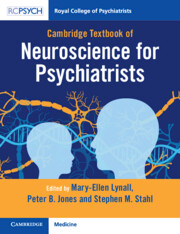Book contents
- Cambridge Textbook Of Neuroscience for Psychiatrists
- Reviews
- Cambridge Textbook of Neuroscience for Psychiatrists
- Copyright page
- Contents
- Contributors
- Introduction
- 1 Cells
- 2 Neurotransmitters and Receptors
- 3 Basic Techniques in Neuroscience
- 4 Neuroanatomy
- 5 Neural Circuits
- 6 Modulators
- 7 Genetics
- 8 Neurodevelopment and Neuroplasticity
- 9 Integrated Neurobiology of Specific Syndromes and Treatments
- 9.1 Autism
- 9.2 Attention Deficit Hyperactivity Disorder
- 9.3 Drug Use, Addiction, Tolerance, Withdrawal and Relapse
- 9.4 Anxiety Disorders
- 9.5 Post-Traumatic Stress Disorder
- 9.6 Obsessive–Compulsive and Related Disorders
- 9.7 Major Depressive Disorder
- 9.8 Bipolar Affective Disorder
- 9.9 Psychosis
- 9.10 Schizophrenia
- 9.11 Borderline Personality Disorder
- 9.12 Self-Harm and Suicidality
- 9.13 Medically Unexplained Symptoms
- 9.14 Delirium
- 9.15 Perinatal Disorders
- 9.16 Sleep Disorders
- 9.17 Eating Disorders
- 9.18 Epilepsy and Seizures
- 9.19 Electroconvulsive Therapy
- 9.20 Brain Stimulation
- 10 Neurodegeneration
- Index
- References
9.15 - Perinatal Disorders
from 9 - Integrated Neurobiology of Specific Syndromes and Treatments
Published online by Cambridge University Press: 08 November 2023
- Cambridge Textbook Of Neuroscience for Psychiatrists
- Reviews
- Cambridge Textbook of Neuroscience for Psychiatrists
- Copyright page
- Contents
- Contributors
- Introduction
- 1 Cells
- 2 Neurotransmitters and Receptors
- 3 Basic Techniques in Neuroscience
- 4 Neuroanatomy
- 5 Neural Circuits
- 6 Modulators
- 7 Genetics
- 8 Neurodevelopment and Neuroplasticity
- 9 Integrated Neurobiology of Specific Syndromes and Treatments
- 9.1 Autism
- 9.2 Attention Deficit Hyperactivity Disorder
- 9.3 Drug Use, Addiction, Tolerance, Withdrawal and Relapse
- 9.4 Anxiety Disorders
- 9.5 Post-Traumatic Stress Disorder
- 9.6 Obsessive–Compulsive and Related Disorders
- 9.7 Major Depressive Disorder
- 9.8 Bipolar Affective Disorder
- 9.9 Psychosis
- 9.10 Schizophrenia
- 9.11 Borderline Personality Disorder
- 9.12 Self-Harm and Suicidality
- 9.13 Medically Unexplained Symptoms
- 9.14 Delirium
- 9.15 Perinatal Disorders
- 9.16 Sleep Disorders
- 9.17 Eating Disorders
- 9.18 Epilepsy and Seizures
- 9.19 Electroconvulsive Therapy
- 9.20 Brain Stimulation
- 10 Neurodegeneration
- Index
- References
Summary
In this section, we describe psychiatric disorders in the perinatal period, with a focus on understanding the triggering of mood and psychotic disorders by childbirth (postpartum psychosis and postnatal depression). We define perinatal disorders and the perinatal period, and the issues around how these episodes of illness are dealt with in the current diagnostic classification systems – the World Health Organization’s International Classification of Diseases, 11th edition (ICD-11) and the American Psychiatric Association’s Diagnostic and Statistical Manual of Mental Disorders, 5th edition (DSM-5) [1, 2].
- Type
- Chapter
- Information
- Cambridge Textbook of Neuroscience for Psychiatrists , pp. 509 - 516Publisher: Cambridge University PressPrint publication year: 2023

